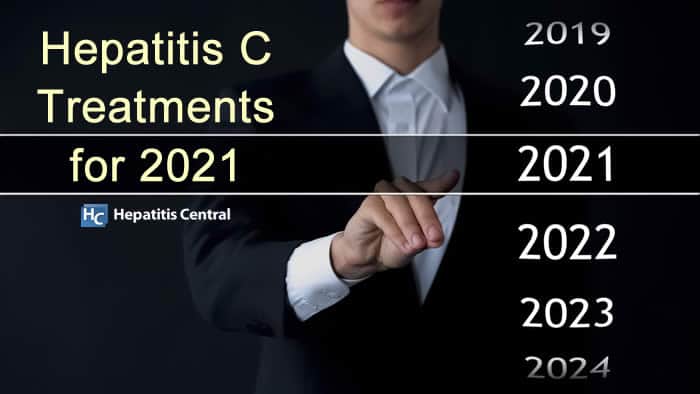Hepatitis C Treatments for 2021


Hepatitis C is the number 1 cause of liver cancer. It affects about three million people in the United States (1) and 71 million people globally.
Treatment of hepatitis C (HCV) has come a long way in the past several years. Historically, HCV patients were given drugs, peglated interferon or ribavirin, which excited your immune system so that you would fight the virus. This was similar to the way you would fight the flu. However, the patients who made it through the year-long treatment weren’t guaranteed remission. Cure rates averaged only about 50%. Then there were the chemo-like side- effects.
Current HCV Treatment Options
There are currently many more options to choose from in treating HCV in 2021, such as:
- protease inhibitors
- polymerase inhibitors
- and direct-acting antivirals (DAAs) (2).
The World Health Organization recommends and promotes the use of DAAs in eradicating and curing hepatitis C (3).
Your eligibility for each medication depends on the genotype of the HCV variant that you are infected with.
The following 3 drugs have FDA approval to treat all six HCV genotypes in those without cirrhosis or with compensated cirrhosis:
Other medications have the approval to treat specific genotypes of hepatitis C, such as:
- Harvoni is approved for genotypes 1, 4, 5 and 6.
- Zepatier is approved for genotypes 1 and 4.
- Sovaldi is approved for genotypes 1-4, and in children 3 years and older.
- Viekiera Pak is approved for genotype 1a or 1b.
On the Horizon
On the horizon of anti-HCV use is the concomitant use of a mathematical method to evaluate the efficacy of such drugs against genotypes 1b and 2a. This method was successfully used to score mono and multi-drug treatment regimens against HCV. This new scoring method could be used to optimize multi-drug treatment regimens (4).
Financial Forecast
One of the main deterrents to the successful cure of HCV globally was the cost of the DAAs needed to treat the disease. Low and middle-income countries can now aim to achieve a price as low as in the United States for a 12-week course of treatment with generic medication (5) due to cost control measures.
Reinfection and Fibrosis
Now that DAAs can cure HCV, the main concern is re-infection, as well as ongoing organ damage from fibrosis. Newer and better anti-fibrosis medications need to be developed. Care needs to be taken to avoid re-infection, especially since vaccination is not currently an option.
A vaccine for HCV has been in the works for several years, but none has been patented to date. The vast improvement in the in-vitro analysis of HCV have greatly aided our understanding of a rational vaccine design (5) but have not driven us to an effective vaccine yet. Patients are encouraged to get vaccinated against hepatitis A and B.
4 Ways to Help Your Liver Heal During Treatment for HCV
Hepatitis C can make your liver unhealthy and sick. Depending on the amount of scarring your liver has incurred, it will have to regenerate the cells that can be made healthy again. This healing can be supported through diet and lifestyle changes.

Below are 4 ways you can help your liver heal (6):
1. Manage Your Weight
People who are overweight or obese may be at higher risk of liver damage or dysfunction. Just a weight loss of 10% can make a big difference in one’s health. Weight management can also protect your liver from nonalcoholic fatty liver disease.
2. Eat Healthy Foods
A liver-friendly diet emphasizes fruits and vegetables, lean sources of protein, and complex carbohydrates. Reduced portions of food help your weight and your liver, so use portion control.
Here are some other liver-healthy habits:
- Avoid added sugar.
- Choose plant-based oils such as olive oil.
- Snack on nuts and seeds.
- Choose low-fat dairy products.
- Avoid saturated fats found in sour cream, packaged meats, and boxed foods.
- Reduce your sodium intake to 2-3 grams per day.
- Drink at least 8-10 glasses of water.
3. Limit Alcohol Intake
Drinking alcohol can harm an already damaged liver. It may be best to refrain from alcohol altogether.
4. Refrain from Over-the-Counter Drugs and Herbals
Consult with a health professional before taking over- the- counter medications such as pain relievers. Supplemental herbals such as valerian, skullcap, kava, comfrey, and shark cartilage can also harm the liver. This is in contrast to Milk Thistle which has been shown to have protective effects on the liver (7).
Conclusion
Recommendations for the treatment of HCV in 2021 are the same as they were in 2020. We are still looking for a vaccine and pushing for earlier screening and identification of those infected. In the midst of expanding treatment options there are also lifestyle changes that can help your liver heal from HCV. Talk to your doctor about these options.
- Viral hepatitis and liver disease. (2020, March). S. Dept. of Veterans Affairs. Retrieved from https://www.hepatitis.va.gov/products/hepatitis-c-facts.asp on 1/29/2021
- What are the newest treatments for hepatitis C? (2020, March 9). Healthline. Retrieved from https://www.healthline.com/health/hepatitis-c/ddg-new-treatment-options
- WHO endorses direct-acting antivirals for treatment of Hepatitis C. (2017, July). World Health Organization. Retrieved from https://www.who.int/hepatitis/news-events/direct-acting-antiviral-cure-hepatitis-c/en/ on 1/29/2021.
- Kakizoe, Y, Koizumi, Y, Ikoma, Y, Ohashi, H. Wakita, T, Iwami, S and Watashi, K. (2021). Required concentration index quantifies effective drug combinations against hepatitis C virus infection. BMC, 18(4). Retrieved from https://tbiomed.biomedcentral.com/articles/10.1186/s12976-020-00135-6
- Duncan J.D., Urbanowicz, R.A., Tarr, A. W., and Ball, J.K. (2020). Hepatitis C virus vaccine: challenges and prospects. Vaccines, 8(1). Retrieved from https://www.mdpi.com/2076-393X/8/1/90/htm
- Hepatitis C and your liver: tips to prevent further damage. (2020, March 6). Retrieved from https://www.healthline.com/health/hepatitis-c/hepatitis-c-and-your-liver#takeaway on 1/29/21.
- Valkova, V., Duranova, H., Bilcikova, J. and Haban, M. (2020). Milk Thistle Marianum: a valuable medicinal plant with several therapeutic purposes. Journal of Microbiology Biotechnology and Food Sciences, 9(4):836-843. Retrieved from https://www.jmbfs.org/issue/february-march-2020-vol-9-no-4/jmbfs_2092fbfs_valkova/?issue_id=6515&article_id=30







